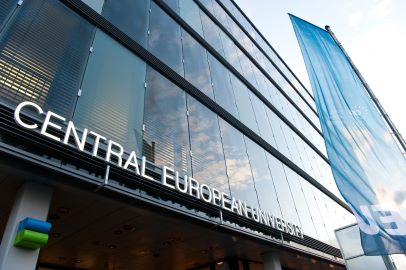Hosted by the Department of Public Policy at Central European University (CEU) in collaboration with the Global Labor Organization (GLO) and the Centre for Economic Policy Research (CEPR) as a part of the GLO Global Conference 2022.
- Format: Hybrid (On-site for the Vienna audience, online public access)
- Venue: Central European University, Quellenstrasse 51, Vienna, Austria
- CEU Website LINK
- December 1, 2022; 16:30-18:30 CET Berlin time
Updated December 7, 2022.
The destruction and death toll that the Russian invasion of Ukraine has inflicted on the country is immense. One day, however, the war will be over. To offer Ukraine a positive prospect of effective, encompassing, and inclusive reconstruction that will not only recreate the status quo ante but will enable the country to upgrade for better, a salient roadmap is needed. One of the first contributions to this effort was the CEPR blueprint on the reconstruction of Ukraine. Following up on this effort, the CEPR has put together a group of scientists around the world, with two lead authors on each chapter – one from the EU and one from Ukraine (although most chapters have more than two authors) – to provide a salient blueprint for the reconstruction from Day 1. CEU and GLO have contributed several experts to this endeavor and will now hold a workshop on the reconstruction of Ukraine covering several chapters broadly related to labor issues on December 1, 2022; 16:30-17:30, at CEU’s Department of Public Policy in Vienna as part of the round the globe, round the clock GLO Global Conference 2022.
Program
16:30-16:35 Welcome
- Martin Kahanec, Head of the Department of Public Policy; Central European University
- Yuriy Gorodnichenko, Editor of the CEPR book on the reconstruction of Ukraine; University of California, Berkeley
16:35-16:55 Healthcare
- Carol Propper, Imperial College London
- Yuriy Dzyghyr, former Deputy Minister of Finance, Ukraine
- Kateryna Maynzyuk, Ministry of Health and Ministry of Finance expert, Ukraine
- Adrianna Murphy, London School of Hygiene and Tropical Medicine
16:55-17:15 Education
- Martin Kahanec, Central European University, Vienna
- Snizhana Leu-Severynenko, USAID Economic Resilience Activity
- Anna Novosad, SavED, Ukraine, former Minister of Education and Science, Ukraine
- Yegor Stadnyi, Kyiv School of Economics, former Deputy Minister of Education and Science, Ukraine
17:15-17:35 Labor Market
- Giacomo Anastasia, Bocconi University, Milan
- Tito Boeri, Bocconi University, Milan
- Marianna Kudlyak, Federal Reserve Bank of San Francisco
- Oleksandr Zholud, National Bank of Ukraine
17:35-17:55 Business Environment
- Yegor Grygorenko, Deloitte Ukraine
- Monika Schnitzer, Ludwig-Maximilian University, Munich
17:55-18:15 EU Enlargement
- Ivan Miklos, MESA 10 and CEU, advisor to the Slovak President, Moldovan Prime Minister, and National Council for the Recovery of Ukraine
- Pavlo Klimkin, Centre for National Resilience and Development, former Foreign Minister of Ukraine
18:15-18:30 Discussion and Closing Remarks
Martin Kahanec, CEU
Bio’s of all speakers see CEU website.
Department of Public Policy (DPP), Central European University
DPP is a multi-disciplinary and global public policy Department at the Central European University in Vienna aiming to create an educational experience that involves not only the acquisition of skills and knowledge but also the cultivation of a mindset that emphasizes social entrepreneurship, innovation, cultural awareness and a commitment to the public good. DPP offers four master’s degrees in public policy, and the public policy track of the Doctor of Philosophy in Political Science program. The Department boasts a team of outstanding resident faculty, world-class visiting faculty made up of top researchers, and practitioners in the public policy field who bring a wide array of academic and practical subjects to DPP’s diverse classroom.
Central European University (CEU) is a research-intensive university specializing in the social sciences, humanities, law, public policy and management. It is accredited in the United States, Austria and Hungary. CEU’s mission is to promote academic excellence, state-of-the-art research, research-based teaching and learning and civic engagement, in order to contribute to the development of open societies. CEU offers bachelor’s, master’s and doctoral programs and enrolls more than 1,400 students from over 100 countries. The teaching staff consists of resident faculty from over 50 countries and prominent visiting scholars from around the world. The language of instruction is English.
Center for Economic Policy Research
The Centre for Economic Policy Research (CEPR) was founded in 1983 to enhance the quality of economic policy-making within Europe and beyond, by fostering high quality, policy-relevant economic research, and disseminating it widely to decision-makers in the public and private sectors. Drawing together the expertise of its Research Fellows and Affiliates, CEPR initiates, funds and coordinates research activities and communicates the results quickly and effectively to policymakers and other decision makers around the world. The Centre is an independent, non-profit organization and takes no institutional policy positions.
Global Labor Organization
The Global Labor Organization (GLO) is a global, independent, non-partisan and non-governmental organization that has no institutional position. The GLO functions as an international network and virtual platform for researchers, policy makers, practitioners and the general public interested in scientific research and its policy and societal implications on global labor markets, demographic challenges and human resources. These topics are defined broadly in line with its Mission to embrace the global diversity of labor markets, institutions, and policy challenges, covering advanced economies as well as transition and less developed countries.
Ends;

